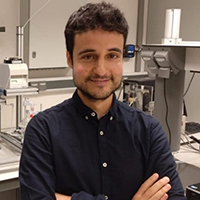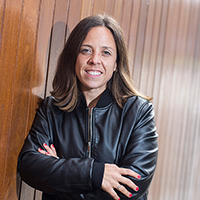Life Cycle Assessment (2020)
Topic outline
-

Teaching Faculty
Jonathan Albo Sánchez
Antonio Domínguez Ramos
María Margallo Blanco
Javier Pinedo Alonso
Chemical and Biomolecular Engineering Department
Life Cycle Assessment (LCA) is a well-known methodology applied to products, processes and services which considers its full life cycle: from the cradle (as natural resources) to the grave (as air emissions, liquid effluents and solid wastes).
The course covers all aspects about how to perform an LCA study: definition of the goal and scope as well as the target audience, gathering data on resource consumption and emissions, burdens to the environment, checking the robustness and significance of results and conclusions, and reporting and reviewing to ensure transparency and quality.
This LCA course includes LCA fundamentals as well as practical activities based on LCA projects. For project development, the students learn how to use openLCA, which is an open-source and free software for Sustainability and Life Cycle Assessment.
Keywords
Sustainable Development; LCA concept; Life cycle thinking; Goal and Scope definition, Inventory; Impact Assessment; Interpretation.
-

Course Information
-
Course: Life Cycle Assessment
-
Code: G799
-
Department / Unit: Chemical and Biomolecular Engineering Department
-
Degree: Degree in Chemical Engineering
-
Faculty: School of Industrial Engineering and Telecommunications
-
ECTS credits: 6
-
Language of instruction: English
-
Instructors: Jonathan Albo Sánchez, Antonio Domínguez Ramos, María Margallo Blanco, Javier Pinedo Alonso
Course structure
Unit 1. Life Cycle Assessment fundamentals
- 1.1. Sustainable Development
- 1.2. Development of the LCA concept
- 1.3. Life Cycle Sustainability Assessment
- 1.4. Europe 2020
- 1.5. Life Cycle Thinking
Unit 2. Life Cycle Assessment methodology- 2.1. Goal and Scope definition
- 2.2. Life Cycle Inventory
- 2.3. Life Cycle Impact Assessment
- 2.4. Interpretation
Unit 3. Practical activities- 3.1. Applied LCA problems
- 3.2. Project with openLCA
-
-

Required reading list
-
R. Horne, T. Grant, K.Verghese, Life Cycle Assessment: Principles, Practice and Prospects. Ed. CSIRO Publishing, (2009).
-
A. Azapagic, R. Clift, S. Perdan, Sustainable Development in Practice: Case Studies for Engineers and Scientists. Ed. John Wiley and Sons, (2004).
-
H. Baumann, A.M. Tillman, The Hitch Hiker’s Guide to LCA, Ed. Studentlitteratur, (2004).
-
M.A. Curran, Life Cycle Assessment Handbook: A Guide for Environmentally Sustainable Products. Ed. Wiley-Scrivener, (2012).
-
A. Ciroth, C. Di Noi, T. Lohse, M. Srocka. OpenLCA 1.9 Comprehensive User Manual, (2019). http://www.openlca.org/wp-content/uploads/2019/07/openLCA-1-9_User-Manual.pdf
Additional reading-
UNE-EN ISO 14040:2006, Environmental management - Life cycle assessment - Principles and framework (ISO 14040:2006).
-
UNE-EN ISO 14044:2006, Environmental management - Life cycle assessment - Requirements and guidelines (ISO 14044:2006
-
A. Aranda Usón, I. Zabalza Bribián. Ecodiseño y Analisis de Ciclo de Vida. Ed. Prensas Universitarias de Zaragoza (2010).
-
-

Applied LCA problems
-
PR-F-001. Task 1. Goal and scope
-
PR-F-002. Task 1. Goal and scope (solution)
-
PR-F-003. Task 2. Cut-off
-
PR-F-004. Task 2. Cut-off (solution)
-
PR-F-005. Task 3. LCIA
-
PR-F-006. Task 3. LCIA (solution)
-
PR-F-007. Case study. Soya production
-
PR-F-008. Case study. Soya production (solution: .xls)
Project with openLCA -
-

Assessment criteria
ASSESSMENT METHODS AND CRITERIA "LIFE CYCLE ASSESSMENT"
Description
Typology
Final assessment
Reassessment
%
Exam. corresponding to the lectures
Written exam
No
Yes
50%
-
Minimum mark: 5,00.
-
Duration: 2 hours
-
Date: After completing the lectures 1 & 2
-
Retake conditions: Final exam in June and/or September
-
Comments: The september retake exam is only for those students who did not pass the June exam
Final report of the group project
Report
No
Yes
20%
-
Minimum mark: 0,00.
-
Duration:
-
Date: At the end of the course
-
Retake conditions: Final exam in June and/or September
-
Comments: The september retake exam is only for those students who did not pass the June exam
Final oral defense of the group project
Oral exam
No
Yes
25%
-
Minimum mark: 0,00.
-
Duration: To be determined
-
Date: At the end of the course
-
Retake conditions: Final exam in June and/or September
-
Comments: The september retake exam is only for those students who did not pass the June exam
Intermediate oral defense of the group project
Oral exam
No
Yes
5%
-
Minimum mark: 0,00.
-
Duration: To be determined
-
Date: During the course
-
Retake conditions: Final exam in June and/or September
-
Comments: The september retake exam is only for those students who did not pass the June exam
TOTAL
100%
COMMENTS:
-
Attendance is strongly recommended to the students. The individual contribution of each student to the group project will be checked in the oral defense of the project during the practical activities.
If the final mark from the test and the group project is below the minimum mark (5.00), the student can pass a retake exam in June (date determined by the ETSIIyT board). An additional retake exam is possible in September (date determined by the ETSIIyT board).
Part-time students COMMENTS:
-
Partial time students can pass the course thanks to the exam corresponding to the lectures that will be taken place before the start of the group projects. A retake exam is possible in June in a date to be determined . A second retake exam is possible in September in a date to be determined.
-
-
-


Jonathan Albo Sánchez
Chemical and Biomolecular Engineering Department
UNIVERSIDAD DE CANTABRIA
More information
Antonio Domínguez Ramos
Chemical and Biomolecular Engineering Department
UNIVERSIDAD DE CANTABRIA
More information
María Margallo Blanco
Chemical and Biomolecular Engineering Department
UNIVERSIDAD DE CANTABRIA
More information
Javier Pinedo Alonso
Chemical and Biomolecular Engineering Department
UNIVERSIDAD DE CANTABRIA
More information

